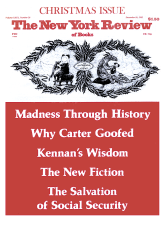In response to:
Pillars of the Third Reich from the May 13, 1982 issue
To the Editors:
Norman Stone has the reviewer’s right to pastronise and dismiss a book if he so chooses. His prerogative surely doesn’t extend, however, to giving readers a completely misleading impression. In his “Pillars of the Third Reich” [NYR, May 13], Stone says of Martin Broszat’s The Hitler State that “it offered no thesis: it merely described what had gone on in the 1930s.” Only the most half-hearted reading of the text could yield such a conclusion, and one supposes that books are not sent to review in order to get such treatment. But to rest with this judgment (and in a “review” of no more than a dozen lines) does a great injustice not only to this book but also to Broszat’s wider opus.
Far from offering “mere description,” Broszat advances here and in his other writings a thesis of some subtlety about the relationship between the structure of the Nazi state and the policies pursued in it. The essence of this thesis is that the policies, especially the most extreme, didn’t grow automatically out of the prescriptions of Nazi ideology, but in practice were partly the outcome of the structural characteristics and conditions of government in Nazi Germany. Among the most important of these were the dynamism of the Party before 1933, its political alliance as a “totalitarian” movement with Germany’s authoritarian elites, the personal absolutism of Hitler as Führer, and—as a consequence of this triad—the proliferation after 1933 of competitive and unco-ordinated power centres, or what Broszat calls the “polyocracy” of the Nazi state. The book is an exhaustive analysis of how this complex power system helped to engender a cumulative radicalisation of Nazism’s programmatic objectives.
There are naturally many criticisms and objections that one might want to make in reviewing Broszat’s analysis: for example, the fact that the term “totalitarian” is used uncritically, the book’s neglect of foreign policy, or even the entire thesis itself for that matter. But Stone doesn’t raise any concrete issues, apart from noting Broszat’s failure to deal with “what, for a Western observer, must count as a central matter, the economics of Nazism” (an ascription of Western priorities that I find cryptic, to say the least). True, Broszat’s focus is almost exclusively political, and this is certainly a limitation. But then the problem he is concerned with is a political one: “the contradiction between the [Nazi] regime’s shapelessness and the extraordinary development of its power” (p. 346). That seems to me to be as central a problem as any, for Western observers no less than for those from other quarters of the compass. Broszat’s analysis of it is also penetrating and plausible. Your reviewer’s silence about all this is not only misleading as to the scope of Broszat’s book; it also implies that for him political history cannot be more than “mere description.”
Jane Caplan
Columbia University
New York City
Norman Stone replies:
It is clear that Miss Caplan should have written the review, and probably the Broszat book as well.
This Issue
December 16, 1982



